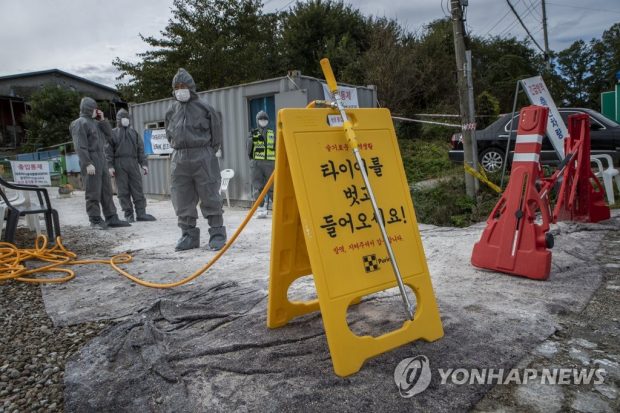Trace of African swine fever found in dead wild boar in DMZ

Quarantine officials set up a sign at a pig farm in Paju, north of Seoul, on Oct. 3, 2019, as they carry out disinfection operations against African swine fever. (Yonhap)
Seoul: South Korea confirmed two more cases of the African swine fever (ASF) on Thursday to raise the total number of cases to 13 in less than three weeks and found traces of the deadly animal virus in a dead wild boar in the Demilitarized Zone (DMZ).
The latest case was reported from Gimpo, northwest of Seoul, according to the Ministry of Agriculture, Food and Rural Affairs. Earlier in the day, another confirmed case was reported from Paju, adjacent to the North Korean border.
Paju is where the country’s first ASF case was confirmed on Sept. 17. South Korea confirmed two ASF cases in the area on Wednesday as well.
All confirmed cases have been reported in areas near the border with North Korea. Suspected cases from south of Seoul have all tested negative.
While South Korea has been struggling to find what brought the virus into the country, the environment ministry on Thursday announced it had found traces of the animal virus from a dead wild boar found in the DMZ near Yeoncheon. A previous ASF case was confirmed in a different area of Yeoncheon on Sept. 18.
The disease is usually spread via contaminated feed, especially leftovers, or by direct contact with people or wild animals with the virus.
Despite the discovery of the virus, however, the environment ministry said it is unlikely that wild boars of the DMZ passed through the barbed-wire fence along the southern limit line.
It marked the first time for the virus to be discovered in wild boars since the environment ministry carried out the investigation in August last year, when the disease broke out in China. So far, more than 1,100 wild boars have been tested.
South Korea will beef up quarantine operations at the border areas and keep close track of wild boars there, the environment ministry added. North Korea has not yet responded to South Korea’s request to carry out joint quarantine operations.
The first-ever case in South Korea came about four months after North Korea reported its first confirmed case of the disease at a farm near its border with China to the World Organization for Animal Health.
YONHAP
























































